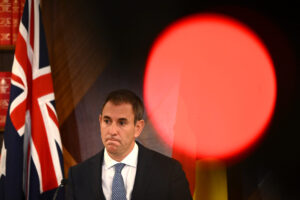In its desperation to cut the company tax rate the Turnbull government is willing to burden future generations with the kind of record budget deficits it has previously sought to pin on the ALP. As an economic strategy it makes little sense but as a political strategy it makes no sense. Indeed the PM seems so keen to deliver something, anything, that looks like reform that he’s managed to trash his party’s key political asset: the perception that the Coalition were better budgeters.
[Article first published by the Australian Financial Review – here]
For decades Australians have been told that responsible governments balance the budget over the ups and downs of the business cycle. But it now seems that responsibility for such conservative fiscal policy has slipped from the Coalition into the hands of the Senate cross bench. In the words of Senator Tim Storer, one of the independents who scuppered the tax cuts last week, “I have doubts that the decision to reduce company tax for all companies is prudent to undertake in the face of Australia’s budget deficit and debt”.
A quick look at the budget papers explains the Senate’s concerns. In 2013 when the Coalition was raging about a “budget emergency” the deficit was $18 billion, but for 2017-18 Treasury are expecting a deficit of $29 billion. But despite the fact that the Coalition has delivered five deficits on the trot the Turnbull government seems determined to slash revenue and increase deficits further. You can’t accuse Turnbull of taking the easy road, although it’s not clear how much political capital he has left in his back pack.
Budgetary blip
Mathias Corman has already started to talk up the significance of a May budget that delivers a bit more revenue, and a smaller budget deficit, than was expected. But while there is no doubt the Coalition will spin any budgetary blip into a story about the budget “turning around”, there is also no doubt that balancing the budget over the business cycle will require a lot more than an uptick in the price of coal and a few good months of retail sales.
According to Budget Paper No.1 the Coalition has delivered more than $170 billion in budget deficits since coming to office. By their folksy logic that you can’t “live beyond your means” or “leave a debt for future generations” that means the Coalition owes the Australian people at least $170 billion worth of budget surpluses before they could even think about generous tax cuts for their business constituents.
And even if the Coalition were patient and disciplined enough to deliver $170 billion worth of sustained surpluses that would only get us back to the level of Commonwealth debt left to us by the former Labor government, a level of debt that the Coalition said at the time constituted a “budget emergency”.
Savage cuts
Back in 2013 Tony Abbott told the Australian public that the record level of Commonwealth debt was costing $1 billion a month to service. And back in 2014 then Prime Minister Abbott told the Australian public that if savage cuts to health, education and welfare were not passed through the Senate then increased Commonwealth debt would lead to the loss of our AAA credit rating and even higher interest payments. But five years later, with Commonwealth debt having grown from $161 billion to $354 billion on the Coalition’s watch, Mr Turnbull is arguing that the budget can afford massive tax cuts for big business. Do they think the internet doesn’t exist?
After decades of claiming some unique skill in “managing the budget” the Coalition has decided, quite literally, to go for broke in its pursuit of expensive tax cuts that the budget clearly cannot afford and the public clearly don’t want. Leaving aside the why of the tax cuts, the problem for the government is around the when. Given that the big tax cuts don’t even kick in for another four years there is simply no reason to pass them now. The prudent thing to do is simply wait to see the state of the budget in four years.
While the BCA are understandably impatient to receive their windfall, deep down they understand the need to wait. As their former president and chair of Tony Abbott’s Commission of Audit told us a few years back: “My rock-solid belief is that you cannot have the kind of sustained economic growth that we in the Business Council – and sensible politicians of all persuasions – have been advocating, if our starting point is a weak budget.” Yep.
Richard Denniss is chief economist at the The Australia Institute
AFR Contributor
Between the Lines Newsletter
The biggest stories and the best analysis from the team at the Australia Institute, delivered to your inbox every fortnight.
You might also like
Stage 3 Better – Revenue Summit 2023
Presented to the Australia Institute’s Revenue Summit 2023, Greg Jericho’s address, “Stage 3 Better” outlines an exciting opportunity for the government to gain electoral ground and deliver better, fairer tax cuts for more Australians.
Richard Denniss: National Press Club Address
On Wednesday, 31 January 2024, Richard Denniss and Allegra Spender MP addressed the National Press Club for a debate on the Stage 3 tax reforms. **Check against delivery** [See below for transcripts] Tax is good. Tax is an investment in our society and the highest taxed countries in the world also happen to be the
18 Reasons why the Stage 3 tax cuts should be redesigned
Australia Institute research shows the Stage 3 income tax cuts are fiscally irresponsible, massively expensive and completely unfair.



